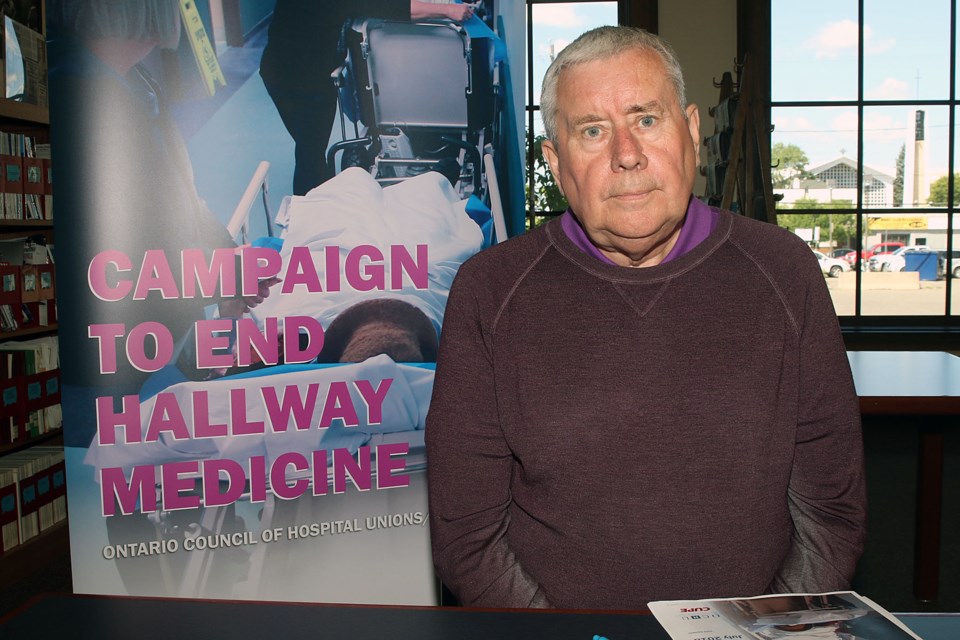For the first time, Ontario's two largest hospital unions are joining forces to do their collective bargaining with the Ontario Hospital Association. It will be a first for the Canadian Union of Public Employees (CUPE) hospital division, the Ontario Council of Hospital Unions (OCHU/CUPE) and the other union, SEIU Healthcare.
Both unions said they have been brought together to fight the Ontario government's Bill 124, which puts a one-per-cent wage cap per year on their collective bargaining agreements.
The fight was outlined Monday in a joint online news conference hosted by (OCHU/CUPE) president Michael Hurley and SEIU Healthcare president Sharleen Stewart.
"We're taking this unprecedented action of bargaining together," said Stewart.
She said Bill 124 was an effort aimed at female-dominated nursing unions and was an attempt "to handcuff women at the bargaining table" and effectively to try to muzzle women before the next election.
Stewart said there are several issues to be argued such as the need to step up mental health services for workers who have struggled with providing health care through the pandemic, as well to to increase wages for personal support workers (PSWs)
"Our unions are here to say that we're joining forces in bargaining to put up the best fight possible to give registered practical nurses (RPNs) the mental health services they deserve; to give PSWs full-time work and to increase staffing so our hospitals are safe and clean for everyone who walks the hallways," said Stewart.
In his comments, Hurley said more than half of the health care members in his organization are working under higher levels of stress, anxiety and depression. He said it has become a regular part of working through the pandemic and trying to provide high-quality care at the same time.
Hurley said even though the provincial government claims health-care workers are modern-day heroes, the way the government treats its workers makes that claim a lie.
"In particular, we want to highlight Bill 124," said Hurley. Unlike police workers, fire department workers and paramedic employees — which he called male-dominated workplaces — Hurley said Bill 124 makes health care a “wage-limited” profession.
Hurley said health care contracts are being limited to wage increases of one per cent in each of three years, dating back to 2019.
"I just draw your attention to the fact that inflation in April, according to StatsCan (Statistics Canada), was 3.4 per cent year over year. This means these health care heroes are taking a real wage cut of 2.4 per cent in the first year of their contract," said Hurley.
The online conference also featured testimonials from a couple of RPNs, who described at length the difficulties of having to cope with the added pressure of working in a health care setting during the pandemic.
Sonja Bernhard of Hamilton, a veteran RPN with 13 years of experience, described seeing residents in tears, fearful they would not get adequate care. She described how her co-workers worked above and beyond expectations to look after residents, yet said she often saw her co-workers being reduced to tears because of the struggle.
"We are tired. We are burnt out. We are constantly given these verbal accolades by the government and simultaneously, they cut the legs out from under us," said Bernhard.
Sheena Woods, an RPN from Thunder Bay, said she was moved to the emergency ward in order to keep her job in a way that she, as a single mom, could also look after her three children. She said the work is intense, that she is expected to perform at an increased level because of the pandemic and that she feels her work is undervalued.
"Our scope and our responsibilities have increased dramatically over the years, and I feel we operate close to the scope of an RN (Registered Nurse) but making significantly less. This has had a tremendous impact on how RPNs feel and are respected as health care professionals."
She said Bill-124, which she said sets wage limits on her job, will only continue to demoralize and under-value the profession.
Hurley said the campaign to repeal Bill 124 will continue in the coming months as various health care workers seek to negotiate new contracts.
For its part, the government said the bill, also called the Protecting a Sustainable Public Sector for Future Generations Act, 2019, will ensure wage increases for public sector employees reflects "the fiscal situation of the province, are consistent with the principles of responsible fiscal management and protect the sustainability of public services."
